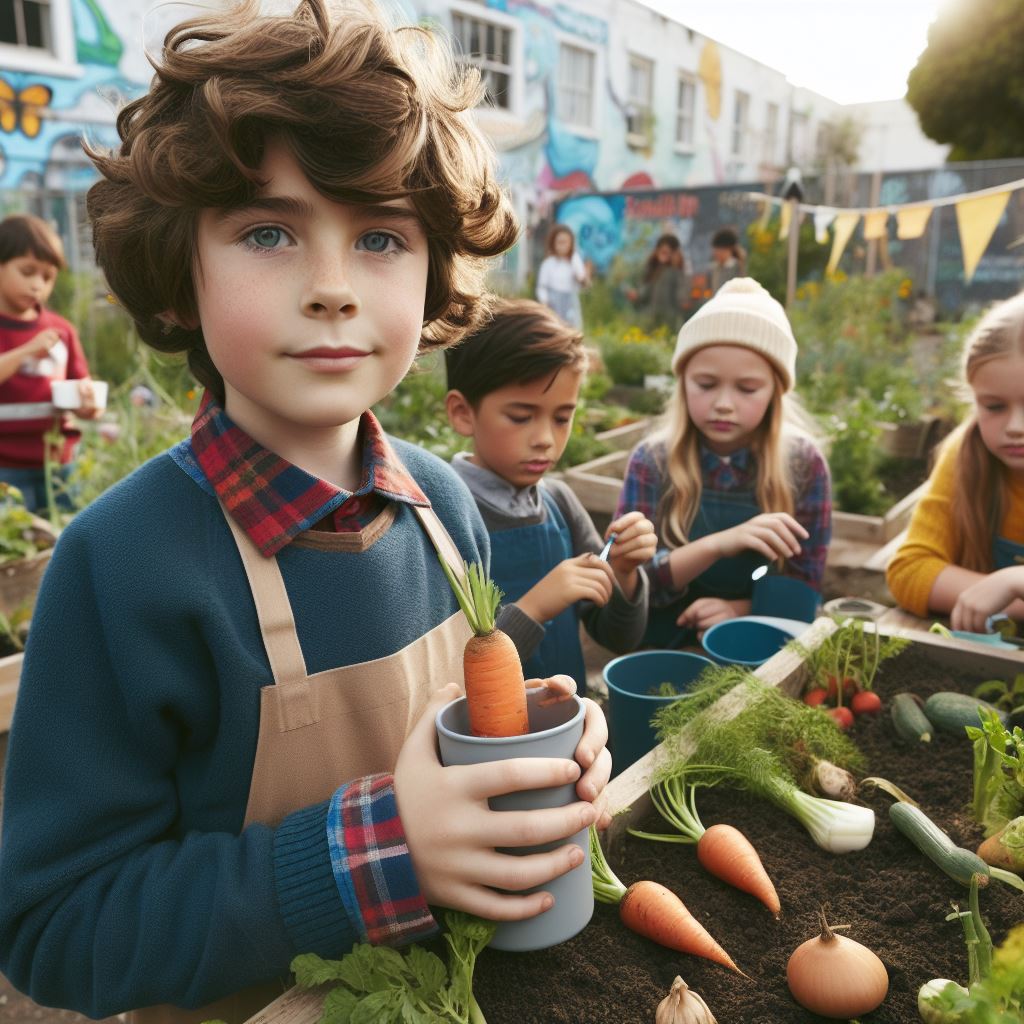Introduction
A city rooftop garden is a concept where gardens are built on the rooftops of buildings.
These gardens are essential in the farm-to-table movement, ensuring fresh and sustainable produce for urban dwellers.
City rooftop gardens not only provide a beautiful and serene environment, but they also serve a greater purpose.
They allow urban dwellers to connect with nature and grow their food in a sustainable and environmentally friendly way.
The farm-to-table movement emphasizes the importance of consuming locally produced, fresh, and seasonal food.
It aims to reduce the distance between the source of food and the consumer, promoting healthier and more sustainable eating habits.
City rooftop gardens contribute significantly to this movement by providing urban dwellers with accessible and fresh produce.
These gardens help reduce the carbon footprint associated with long-distance food transportation and decrease reliance on artificial additives and preservatives.
By growing fruits, vegetables, and herbs on rooftops, city dwellers can enjoy the benefits of farm-to-table cuisine without compromising on quality or freshness.
These gardens offer a unique dining experience, where people can harvest their food and transform it into delicious meals right at home.
In short, city rooftop gardens are integral to the success of the farm-to-table movement.
They provide fresh and sustainable produce to urban dwellers, reduce the environmental impact of food transportation, and offer a unique and rewarding gardening experience.
Embracing rooftop gardens is a step towards a more sustainable and healthier future for city dwellers.
Read: Local Food Trends in CSA
Benefits of City Rooftop Gardens
Sustainable food production
- Reduction of food transportation: Rooftop gardens allow for the cultivation of fresh produce in urban areas, reducing the need to transport food from rural areas.
- Minimization of carbon footprint: By growing food locally, rooftop gardens help minimize the carbon emissions associated with long-distance food transportation.
Improved air and water quality
- Absorption of air pollutants: City rooftop gardens act as natural air filters, absorbing harmful pollutants and improving overall air quality.
- Rainwater harvesting and filtration: These gardens help capture rainwater, reducing stormwater runoff and allowing for natural filtration before it enters waterways.
Creation of green spaces
- Enhancing urban landscapes: Rooftop gardens add greenery to the concrete jungle, improving aesthetics and providing a sense of tranquility in urban environments.
- Providing recreational areas for communities: These green spaces offer opportunities for recreation and relaxation, fostering a sense of community among city dwellers.
Promotion of biodiversity and pollination
- Support for local ecosystems: Rooftop gardens provide habitat for various plants and insects, contributing to the preservation of local ecosystems.
- Attraction of bees and other pollinators: These gardens attract bees and other pollinators, supporting the pollination of urban plants and nearby green spaces.
In essence, city rooftop gardens offer numerous benefits to urban areas.
Transform Your Agribusiness
Unlock your farm's potential with expert advice tailored to your needs. Get actionable steps that drive real results.
Get StartedThey contribute to sustainable food production by reducing the need for long-distance food transportation and minimizing carbon emissions.
These gardens also improve air and water quality by absorbing pollutants and capturing rainwater for natural filtration.
Furthermore, rooftop gardens create green spaces, enhancing the urban landscape and providing recreational areas for communities.
Lastly, they promote biodiversity and pollination by supporting local ecosystems and attracting important pollinators like bees.
Incorporating rooftop gardens into cities can transform them into greener and more sustainable environments.
Read: Cooking with CSA Veggies
Challenges and Solutions
Limited space and weight restrictions
- Utilization of vertical gardening methods: Growing plants vertically maximizes space efficiency.
- Selection of lightweight planting materials: Opt for lightweight pots, soil mixtures, and planting structures.
Structural considerations and safety requirements
- Consultation with professionals for structural assessments: Ensure the rooftop can support the added weight of the garden.
- Implementation of safety measures, such as guardrails: Install guardrails to prevent accidents and ensure the safety of gardeners and visitors.
Irrigation and water management
- Installation of efficient drip irrigation systems: Drip irrigation minimizes water waste and ensures plants receive proper hydration.
- Utilization of rainwater collection and storage: Build rainwater harvesting systems to provide a sustainable water source for the garden.
Community involvement and maintenance
- Establishment of collective gardening efforts: Encourage community members to participate in gardening and share responsibilities.
- Regular maintenance schedule and responsibilities: Create a maintenance calendar and assign tasks to ensure the garden is well-taken care of.
City rooftop gardens face various challenges, but with innovative solutions, these obstacles can be overcome to create flourishing farm-to-table spaces.
Read: CSA vs Supermarket Produce

Gain More Insights: Farmers’ Tales: Stories Behind Your Food
Success Stories and Examples
High Line Park, New York City
- Unused railway transformed into an elevated park with gardens: High Line Park in New York City is a remarkable success story in the world of city rooftop gardens.
What once was an unused railway track has now become an innovative park filled with beautiful gardens.
The transformation of the railway into an elevated park was a bold and visionary move.
It not only revitalized the area but also created a sustainable and green space for the community to enjoy.
The gardens in High Line Park are not only aesthetically pleasing but also functional, providing fresh produce for farm-to-table dining in partnership with local restaurants. - Partnership with local restaurants to supply fresh produce for farm-to-table dining: The park’s commitment to sustainable agriculture is commendable.
By utilizing rooftop gardens, they are able to produce a significant amount of fresh produce, reducing the need for transportation and lowering carbon emissions.
The partnership with local restaurants ensures that the produce reaches the tables of the community, providing a truly farm-to-table experience.
Chicago City Hall Rooftop Garden
- First certified green rooftop garden in Chicago: The Chicago City Hall Rooftop Garden is another inspiring example of a successful city rooftop garden.
It holds the distinction of being the first certified green rooftop garden in Chicago, setting an example for other buildings and institutions in the city. - Production of over 1,000 pounds of organic fruits and vegetables annually: One of the remarkable achievements of the Chicago City Hall Rooftop Garden is its ability to produce over 1,000 pounds of organic fruits and vegetables every year.
This not only provides fresh and healthy produce for the building’s occupants but also demonstrates the potential of rooftop gardens to contribute to a sustainable food system.
The garden’s success is also attributed to its innovative design and implementation techniques.
By utilizing various organic farming practices, such as companion planting and composting, the garden is able to thrive and produce abundant yields.
Edible Schoolyard Project, California
The Edible Schoolyard Project in California is revolutionizing education by integrating rooftop gardens into the school curriculum.
This innovative approach not only teaches students about sustainable agriculture practices but also provides them with hands-on experience in growing their own food.
- Integration of rooftop gardens in school curriculum: By incorporating rooftop gardens into the school curriculum, students are exposed to the importance of sustainable food systems and the impact they can have on their health and the environment.
They learn valuable skills in gardening and farming while also gaining a deeper understanding of where their food comes from. - Education on sustainable agriculture practices for students:The Edible Schoolyard Project serves as an inspiration for other educational institutions to implement similar initiatives.
It showcases the power of rooftop gardens in engaging and educating students about environmental stewardship and sustainable living.
In a nutshell, these success stories and examples illustrate the immense potential of city rooftop gardens.
Whether it’s transforming unused spaces, producing fresh and organic produce, or integrating gardens into education, rooftop gardens are transforming city landscapes and promoting sustainable agriculture practices
Read: CSA Membership: Pros & Cons.
Conclusion
City rooftop gardens play a crucial role in the farm-to-table movement by providing a source of fresh, locally grown produce.
These gardens help reduce the carbon footprint associated with transporting food from rural areas to cities.
As we have seen, the benefits of city rooftop gardens are numerous.
It is essential for cities to continue implementing and expanding these gardens to meet the increasing demand for fresh and sustainable food.
City rooftop gardens have the potential to transform urban agriculture by utilizing otherwise unused spaces to grow food and promote a healthier lifestyle.
Rooftop gardens inspire individuals by connecting them to the food they eat, fostering healthier choices and awareness of food sources.
Basically, city rooftop gardens are more than just green spaces on top of buildings.
They are valuable contributors to the farm-to-table movement, encouraging sustainability, reducing carbon emissions, and supporting a healthier lifestyle.
Showcase Your Farming Business
Publish your professional farming services profile on our blog for a one-time fee of $200 and reach a dedicated audience of farmers and agribusiness owners.
Publish Your ProfileWith further implementation and expansion, these gardens have the power to transform urban agriculture and promote a more sustainable future for our cities.




